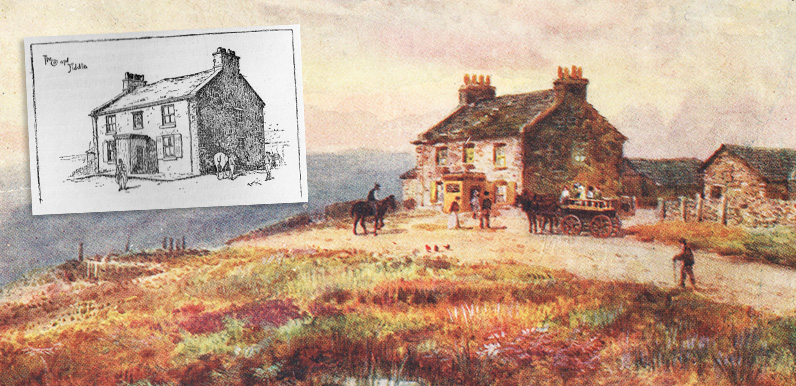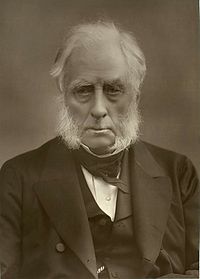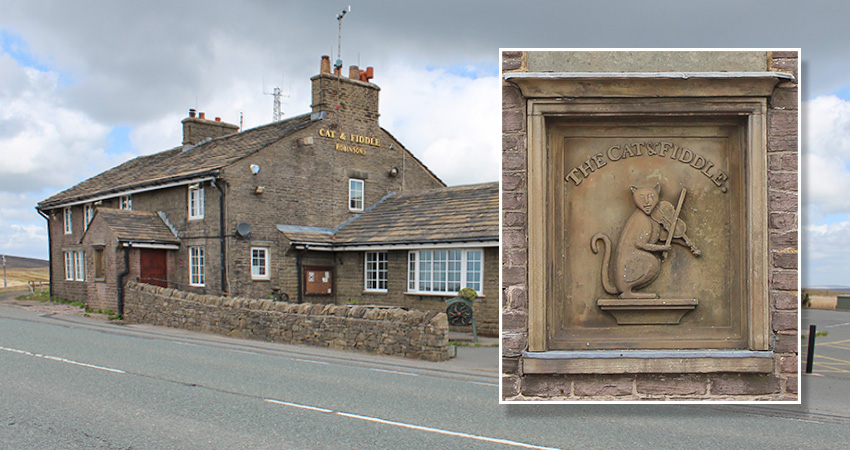Inset: A line illustration of the same view accompanied Strephon’s report of his 1888 visit.
At the time of writing, the famous Cat & Fiddle pub, lying on windswept moorland close to the source of the River Goyt, is a very sorry sight. It’s been closed for some months now. There are plans to convert it into “a haven for outdoor adventurers”, but I don’t think the brewery is that enthusiastic. (See Mike’s comment at the bottom of this page for details.)
The pub has been a popular stopping-off point for visitors since Victorian times – particularly from the nearby spa town of Buxton. This description of a visit in 1888 is by Strephon and is taken from his book ‘Pictures of the Peak’, published in 1891.
A carriage from Buxton passes us just before we reach the Cat and Fiddle. Its inmates, although covered with shawls and rugs, are shivering with cold. (The date is the 4th of May, 1888.) They are evidently not accustomed to the thin fluent air and ozone-laden breezes of these mountainous moorlands.
A pause at the Cat and Fiddle, which is in Cheshire, a mile from the Derbyshire frontiers. A square weather-beaten house of grim, gray stone, with a sentry-box-like porch with doors at either side to protect the inner front door from the bombardment of the wind.
The feline sign of the house is carved in stone over the portals; and in the front room there is a painting in oils, by one of the Van Daub school, of a grinning Grimalkin, with a tail of remarkable convolution, seated on a chair, playing a fiddle before an open window.
The musical score placed before the performer is “Home, sweet Home,” and the apartment has violent green walls relieved by a dado of excruciating white. The picture is signed “George Peters, Epsom, Surry (sic), 1826.”
On the table in this front room is a Visitors’ Book full of Colney Hatch doggerel*, and the window is scratched all over with the names of the Great Unknown anxious to remind an indifferent world that they wear diamond rings.
The late Duke of Devonshire, who was fond of driving up to the Cat and Fiddle, once asked old Cotterel, a former landlord, to whom the house belonged. “To the Grimshaws, of Errwood, your grace.” “I thought it was mine,” said the careless Cavendish, lighting his pipe. “If it had been, I meant building you an hotel here.”
The Duke gave his humble host a photograph – from a portrait – of his favourite long-haired Russian cat with a fiddle by its side. It is an heirloom in the family, and the last time I was at Goyt’s Moss the photograph was shown me with no little pride.
The situation of the Cat and Fiddle is just the place for a comfortable little hotel. The altitude, the purity of the air, and the scenic surroundings would recommend such a caravanserai alike to invalids and pleasure seekers.
The modern school of medical science recommends an elevation of 1,800 to 2,000 feet above sea-level as a restorative in invalided conditions, and even in advanced pulmonary cases.
Such an eminent authority as Dr. Hyde is of opinion that people suffering from consumption have more chance of recovery in a thin, fluent mountain air than they have in places where the atmosphere is blander and less rarified.



If my memory serves me right, which is often not the case, there used to be a pub/cafe further along the road from the Cat and Fiddle which was either called, or colloquially known, as the Dish and Spoon. Do you have any information and images of this property and its history?